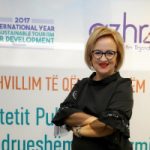speakers

Efka Heder
Team Leader- Alled 2

Renata Kongoli
Prof. Dr

Klodiana Gorica
Prof. Dr

Blerim Gjeladini
Founder of Terra World
The Regional Economic Forum – Dukagjini
The Regional Economic Forum – Dukagjini (FER-D), founded by the University “Haxhi Zeka”, in partnership with the municipalities of Peja, Deçan, Klina, Istog, Junik, Gjakova and Malisheva, is a permanent platform where participants from the central government and local government, businesses, civil society, experts, academic staff and students, discuss and collaborate to identify, analyze and address challenges and opportunities for economic growth at local, regional and wider levels. FER-D aims to improve the coordination of interaction between these subjects and help create policies, strategies and suitable projects to help the economic development of the country.
The goals of a regional economic forum that involve universities, local and central government, and the business sector may vary depending on the specific context and priorities set by the organizers. However, some of the more common goals of these types of conferences may include:
- Building and strengthening relations between academia, the public sector and the private sector.
- Exchange of ideas and experiences regarding current economic challenges and opportunities in the region.
- Promoting a coordinated way to address issues of public economic policies, such as infrastructure development, support for innovation, employment policy, etc.
- Encouraging interregional and international cooperation to address economic issues that affect more than one country or region.
- Inclusion of policy choices with scientific basis and proven by academic studies and analysis of studies.
- Advocacy for the future approach to feelings, innovative and sustainable activity to promote economic growth and prosperity of citizens.
- Creation and utilization of new opportunities for investment and entrepreneurship from the business sector.
- Establishing close relations between the public and private sectors to improve the coordination and implementation of strategies and economic policies.
In this context, “Haxhi Zeka” university and this forum intend to operate with the Triple Spiral model which connects the University – Government Institutions – Industry. This model refers to a collaborative model that emphasizes the interconnection and cooperation between these three sectors and promotes innovation, economic growth and social progress. Each of these sectors plays a distinct role: Universities play a crucial role in generating new ideas, technologies and skilled graduates who can contribute to both industry and government sectors; Government institutions define policies that promote research and innovation, provide funding for research projects and create frameworks for cooperation between universities and industry; industry is the main actor in translating research and knowledge created in universities into practical applications and innovations that can drive economic growth. Collaboration with universities allows industry to have access on research and expertise, driving the development of new products, services and technologies.
Therefore, the goal is to create an environment where all three sectors work together to address complex challenges, seize opportunities and contribute to the well-being of society as a whole. Cooperation and synergy between these three sectors can lead to a more robust and dynamic innovation ecosystem, promoting the flow of knowledge, skills and resources between academia, government institutions and industry, fostering economic competitiveness and societal advancement.
The functions of the “Haxhi Zeka” university are not only teaching and research, but its aim is to engage and contribute to the community, contributing to economic and social development, beyond academic and research activity, thus fulfilling its Third Mission.
In this context, the objectives of FER-D are:
- Encouraging inter-regional dialogue in order to promote economic policies, social, political and cultural values;
- Interaction and cooperation with businesses/industry in terms of coordinating investment projects of interest to the region and beyond;
- Providing and advancing innovative ideas that lead to the design of investment projects, with the aim of including and mobilizing diaspora capital;
- Encouraging and promoting foreign direct investments and improving the climate for doing business in Kosovo and the region.
- Exchange of knowledge and experiences
- Identification of opportunities and challenges
- Encouragement for regional integration and joint projects.
Excellent speakers! For free!
Who can attend?
- Faculty
- Staff
- Students
- General public
Why you should?
- Kernel
- Virtual memory
- Multitasking
- Networking
From the late 1960s through the late 1970s, several hardware capabilities evolved that allowed similar or ported software to run on more than one system. Early systems had utilized microprogramming to implement features on their systems in order to permit different underlying computer architectures to appear to be the same as others in a series. In fact, most 360s after the 360/40 (except the 360/165 and 360/168) were microprogrammed implementations.
The enormous investment in software for these systems made since the 1960s caused most of the original computer manufacturers to continue to develop compatible operating systems along with the hardware. Notable supported mainframe operating systems include:
- IBM CP-67 – IBM System/360
- UNIVAC EXEC 8 – UNIVAC 1108
- Burroughs MCP – B5000, 1961
- IBM OS/360 – IBM System/360
